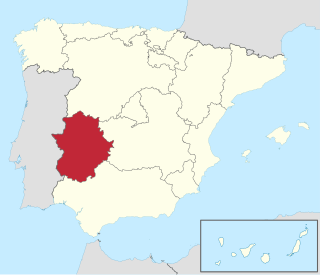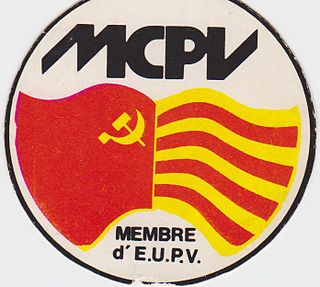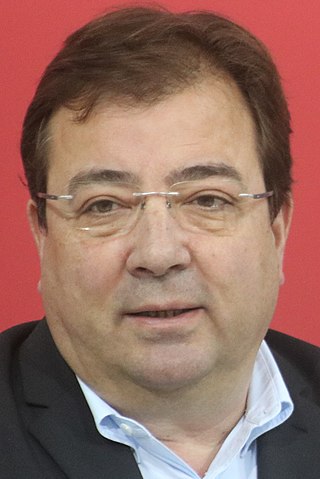
Extremadura is a landlocked autonomous community of Spain. Its capital city is Mérida, and its largest city is Badajoz. Located in the central-western part of the Iberian Peninsula, it is crossed from east to west by the Tagus and Guadiana rivers. The autonomous community is formed by the two largest provinces of Spain: Cáceres and Badajoz. Extremadura is bordered by Portugal to the west and by the autonomous communities of Castile and León (north), Castilla–La Mancha (east), and Andalusia (south).

The Galician Nationalist Bloc is a political party from Galicia, formed with the merger of a series of left-wing Galician nationalist parties. It is self-defined as a "patriotic front".

The Spanish Communist Workers' Party is an anti-revisionist Marxist-Leninist communist party in Spain. It was founded in 1973, when Enrique Líster revolted against the Eurocommunist line of Communist Party of Spain (PCE) general secretary Santiago Carrillo. The party published Análisis.

The Valencian Nationalist Bloc was a Valencian nationalist party in the Valencian Country, Spain. It was the largest party in the Coalició Compromís until 2021, when it was replaced in a refoundation process by Més–Compromís.

Communist Movement of the Valencian Country was a communist political party created in the Valencian Country during the last years of the dictatorship of Franco as the Valencian section of the Communist Movement. Originally the party was maoist and heavily pro-Chinese, but since the early 80's the party abandoned maoism in favour of heterodox Marxism and started to support the new social movements, including feminism, LGBT and anti-militarism.

The 2011 Extremaduran regional election was held on Sunday, 22 May 2011, to elect the 8th Assembly of the autonomous community of Extremadura. All 65 seats in the Assembly were up for election. The election was held simultaneously with regional elections in twelve other autonomous communities and local elections all throughout Spain.

The 2015 Extremaduran regional election was held on Sunday, 24 May 2015, to elect the 9th Assembly of the autonomous community of Extremadura. All 65 seats in the Assembly were up for election. The election was held simultaneously with regional elections in twelve other autonomous communities and local elections all throughout Spain.

The 1983 Extremaduran regional election was held on Sunday, 8 May 1983, to elect the 1st Assembly of the autonomous community of Extremadura. All 65 seats in the Assembly were up for election. The election was held simultaneously with regional elections in twelve other autonomous communities and local elections all throughout Spain.

The 1987 Extremaduran regional election was held on Wednesday, 10 June 1987, to elect the 2nd Assembly of the autonomous community of Extremadura. All 65 seats in the Assembly were up for election. The election was held simultaneously with regional elections in twelve other autonomous communities and local elections all throughout Spain, as well as the 1987 European Parliament election.

The 1991 Extremaduran regional election was held on Sunday, 26 May 1991, to elect the 3rd Assembly of the autonomous community of Extremadura. All 65 seats in the Assembly were up for election. The election was held simultaneously with regional elections in twelve other autonomous communities and local elections all throughout Spain.

The 1995 Extremaduran regional election was held on Sunday, 28 May 1995, to elect the 4th Assembly of the autonomous community of Extremadura. All 65 seats in the Assembly were up for election. The election was held simultaneously with regional elections in twelve other autonomous communities and local elections all throughout Spain.

The 1999 Extremaduran regional election was held on Sunday, 13 June 1999, to elect the 5th Assembly of the autonomous community of Extremadura. All 65 seats in the Assembly were up for election. The election was held simultaneously with regional elections in twelve other autonomous communities and local elections all throughout Spain, as well as the 1999 European Parliament election.

The 2003 Extremaduran regional election was held on Sunday, 25 May 2003, to elect the 6th Assembly of the autonomous community of Extremadura. All 65 seats in the Assembly were up for election. The election was held simultaneously with regional elections in twelve other autonomous communities and local elections all throughout Spain.

The 2007 Extremaduran regional election was held on Sunday, 27 May 2007, to elect the 7th Assembly of the autonomous community of Extremadura. All 65 seats in the Assembly were up for election. The election was held simultaneously with regional elections in twelve other autonomous communities and local elections all throughout Spain.

Democratic Left Front, was a left-wing political coalition in Spain. The coalition was formed by the Party of Labour of Spain (PTE), the Independent Socialist Party, Independent Socialist Bloc, Party of Communist Unification in the Canaries and Communist Unification of Spain (UCE) to participate in the 1977 general elections. Most of those parties were still illegal at the time of the election. FDI presented lists in all Spain, except in Catalonia, were the PTE ran in a coalition with Republican Left of Catalonia (ERC), called Left of Catalonia–Democratic Electoral Front (EC-FED). The coalition failed to win any seat, and dissolved shortly afterwards.

Cáceres is one of the two constituencies represented in the Assembly of Extremadura, the regional legislature of the Autonomous Community of Extremadura. The constituency currently elects 29 deputies. Its boundaries correspond to those of the Spanish province of Cáceres. The electoral system uses the D'Hondt method and a closed-list proportional representation, with a minimum threshold of five percent.

Badajoz is one of the two constituencies represented in the Assembly of Extremadura, the regional legislature of the Autonomous Community of Extremadura. The constituency currently elects 36 deputies. Its boundaries correspond to those of the Spanish province of Badajoz. The electoral system uses the D'Hondt method and a closed-list proportional representation, with a minimum threshold of five percent.

The 2019 Extremaduran regional election was held on Sunday, 26 May 2019, to elect the 10th Assembly of the autonomous community of Extremadura. All 65 seats in the Assembly were up for election. The election was held simultaneously with regional elections in eleven other autonomous communities and local elections all throughout Spain, as well as the 2019 European Parliament election.

Campo Arañuelo is a comarca in Cáceres, Extremadura, Spain. It contains the municipalities of Almaraz, Belvís de Monroy, Berrocalejo, Bohonal de Ibor, Casas de Miravete, Casatejada, El Gordo, Higuera de Albalat, Majadas, Mesas de Ibor, Millanes, Navalmoral de la Mata, Peraleda de la Mata, Romangordo, Rosalejo, Saucedilla, Serrejón, Talayuela, Tiétar, Toril, Valdecañas de Tajo, Valdehúncar. Notable for the Dolmen de Guadalperal, the "Spanish Stonehenge".
María Teresa Rejas Rodríguez is a Spanish teacher and politician who served in the Assembly of Extremadura from 1991 until 2007. A member of the Communist Party of Spain and the United Left, Rejas was the first female president of the assembly, holding the position as part of a coalition agreement from 1995 to 1997.















